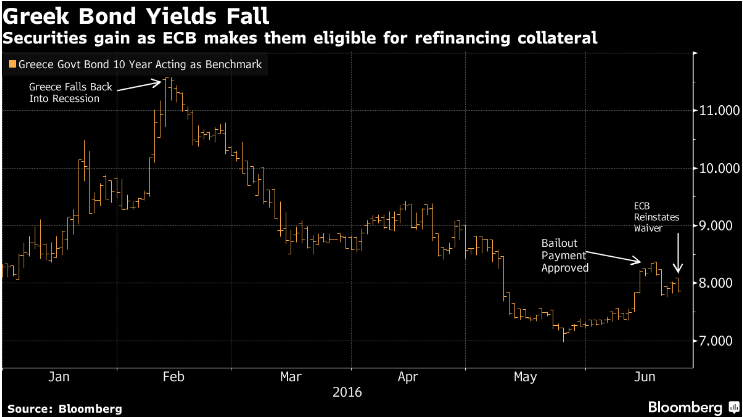At a meeting in Frankfurt, the European Central Bank's governing council reinstated the waiver that allows Greek sovereign bonds to be accepted as collateral for regular auctions of ECB cash, despite their junk rating. The waiver would come into force on June 29th. Greek officials are also cautiously optimistic that the governing council will in September approve the country’s entry to the bank’s quantitative easing programme (QE), which would boost the government’s chances of regaining access to international capital markets.
“The governing council acknowledges the commitment of the Greek government to implementing current [bank rescue fund] programme and expects continued compliance with its conditionality,” the ECB said.
The ECB had in May 2010, granted Greek banks a special waiver to allow them to use Greek sovereign bonds as collateral, despite their junk status. However, Greek Prime Minister Alexis Tsipras and his radical Syriza party stormed to power in January 2015, threatening to rescind on the terms of its international bailout. The ECB has since stopped accepting Greek sovereign bonds as collateral on signs that Greece could fall out of its bailout programme. The Greek banks were as a consequence forced to rely on more expensive emergency lending by the central bank of Greece.
However, the shift back to borrowing from the ECB is a positive development for Greek banks. With the decision to reintroduce the waiver for Greece from June 29, the ECB is effectively welcoming Greece back into the fold of fully-fledged eurozone borrowers and lowering the borrowing costs for Greek banks.
Greece’s 10-year bonds advanced for the first time in three days, while the yield on notes due in July 2017 slid to the lowest in two weeks. Greece’s 10-year bond yields fell 11 basis points, or 0.11 percentage point, to 7.89 pct and were holding at 8.002 pct at 1145 GMT.
“Greece showed more willingness for compromise this time and the creditors did not want to have additional headline risk, given the Brexit referendum. In case there is no Brexit, I would expect more demand for Greek government bonds,” said Daniel Lenz, a market strategist at DZ Bank AG in Frankfurt.



 Dollar Near Two-Week High as Stock Rout, AI Concerns and Global Events Drive Market Volatility
Dollar Near Two-Week High as Stock Rout, AI Concerns and Global Events Drive Market Volatility  Yen Slides as Japan Election Boosts Fiscal Stimulus Expectations
Yen Slides as Japan Election Boosts Fiscal Stimulus Expectations  RBA Raises Interest Rates by 25 Basis Points as Inflation Pressures Persist
RBA Raises Interest Rates by 25 Basis Points as Inflation Pressures Persist  UK Starting Salaries See Strongest Growth in 18 Months as Hiring Sentiment Improves
UK Starting Salaries See Strongest Growth in 18 Months as Hiring Sentiment Improves  BOJ Rate Decision in Focus as Yen Weakness and Inflation Shape Market Outlook
BOJ Rate Decision in Focus as Yen Weakness and Inflation Shape Market Outlook  Japan Economy Poised for Q4 2025 Growth as Investment and Consumption Hold Firm
Japan Economy Poised for Q4 2025 Growth as Investment and Consumption Hold Firm  Why Trump’s new pick for Fed chair hit gold and silver markets – for good reasons
Why Trump’s new pick for Fed chair hit gold and silver markets – for good reasons  Gold and Silver Prices Climb in Asian Trade as Markets Eye Key U.S. Economic Data
Gold and Silver Prices Climb in Asian Trade as Markets Eye Key U.S. Economic Data  Bank of Japan Signals Readiness for Near-Term Rate Hike as Inflation Nears Target
Bank of Japan Signals Readiness for Near-Term Rate Hike as Inflation Nears Target  China Extends Gold Buying Streak as Reserves Surge Despite Volatile Prices
China Extends Gold Buying Streak as Reserves Surge Despite Volatile Prices  South Africa Eyes ECB Repo Lines as Inflation Eases and Rate Cuts Loom
South Africa Eyes ECB Repo Lines as Inflation Eases and Rate Cuts Loom  Vietnam’s Trade Surplus With US Jumps as Exports Surge and China Imports Hit Record
Vietnam’s Trade Surplus With US Jumps as Exports Surge and China Imports Hit Record 































